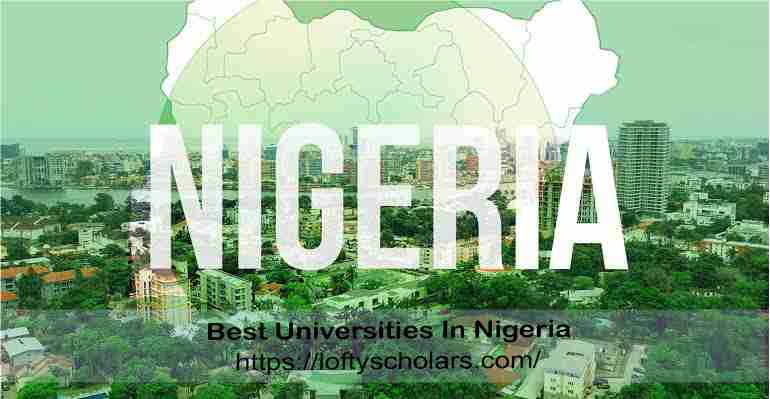
Best Universities In Nigeria
Introduction
Lofty Scholars tries to answer the question of which universities are the best in Nigeria by writing an article about it.
Certainly, giving a good education to their kids is really important for parents. In Nigeria, there are more than 500 universities, but only a small number are thought to be the best by the National Universities Commission (NUC).
Overview of Best Universities In Nigeria
Which universities in Nigeria are considered the best, and how do they decide this? The National Universities Commission (NUC) recently published a new list of the finest universities in Nigeria. This can be useful if you’re looking for a good local university for your children.
If you want to know which university is the best in Nigeria based on the NUC’s ranking, you can read more about it in the article linked below.
1. University of Ibadan
NUC representatives say that the University of Ibadan is the best university in Nigeria. The university has 13 different areas of study and started in 1947 as part of the University of London. At first, it taught local students about Arts, Science, and Medicine. In 1962, it became its own official university.
Applicants can choose from 13 different subject areas. Arts, Science, Basic Medical Sciences, Clinical Sciences, Agriculture and Forestry, Social Sciences, Education, Veterinary Medicine, Pharmacy, Technology, Law, Public Health, and Dentistry. Some subject areas, like Basic Medical Sciences, Clinical Sciences, and Public Health and Dentistry belong to the University’s College of Medicine.
Apart from the regular academic departments, the University of Ibadan also has special study centers like the Institute of Child Health, Institute of Education, Institute of African Studies, and more.
They also have centers for specific things like Centre for Child Adolescent and Mental Health, Centre for Educational Media Resource Studies, African Regional Centre for Information Science (ARCIS), Centre for Peace and Conflict Studies (CEPACS), Centre for Petroleum, Energy, Economics and Law (CPEEL), Centre for Sustainable Development (CESDEV), Centre for Entrepreneurship and Innovation (CEI), Institute for Advanced Medical Research and Training (IAMRAT), Centre for Drug Discovery, Development & Production (CDDDP), and Centre for Control & Prevention of Zoonosis (CCPZ)..
2. University of Lagos
The University of Lagos is a really good university in Nigeria. It started in 1962 and is in Lagos, a busy city. It has three parts in Akoka, Yaba, and Surulere. People call it the “University of First Choice” and the Nation’s Pride.
When the university first started, there were only 131 students. But now, there are about 40,000 students there. The university has about 3365 staff members who work there. They offer different courses in 12 faculties which are, including Arts, Basic Medical Science, Business Administration, Clinical Sciences, Dental Sciences, Education, Engineering, Environmental Science, Law, Pharmacy, Science, and Social Science.
Also, the university has two special places called centers. One is for Human Rights, and the other is for African Regional Integration and Borderland Studies.
If you’re not close to Lagos, you can still study at UNILAG through the Distance Learning Institute. They have courses like Accounting, Business Administration, Science Education, and Library Information Services that you can learn from far away.
3. Obafemi Awolowo University
Obafemi Awolowo University, also called the University of Ife, started in 1962 and is spread across a big area of 11,862 hectares. It has a main campus where students learn and live, as well as offices, a place for training and research farming. In the 1970s and 1980s, OAU was a top school in Africa, and its students have become famous, winning Nobel Prizes and important awards in the country.
The university has a few other places that are connected to it. These include the Centre for Energy Research and Development (CERD), the National Centre for Technology Management (NACETEM), the African Regional Centre for Space Science and Technology Education- English (ARC SSTE-E), and the United Nations Regional Centre for Training in Aerospace Survey (RECTAS).
4. Ahmadu Bello University
Ahmadu Bello University (ABU) got its name from a respected leader, Sardauna of Sokoto, and was founded in 1962. It’s located where the Nigerian College of Arts, Science and Technology used to be, along with other places like the Clerical Training Centre in Kongo, the Samaru Agricultural Research Station, and the Shika Livestock Farm.
Right now, ABU has 12 different parts for learning, 2 places where students study, 1 school for advanced studies, and 82 groups of subjects that students can choose from. There are around 35,000 students who go there.
Also, there are 5 special places for learning, 6 centers that focus on specific things, a section for colleges that teach about farming, a school for helping students with basic studies, a high school for showing how things work, a primary school, and a business for giving advice. ABU has about 1,400 teachers and 6,000 other workers who help run the university.
5. University of Ilorin
The University of Ilorin started in 1976 and had its first group of 200 students in October of that year. Right now, it has 15 groups for learning different subjects. In 2014, it became the first Nigerian university to be among the top 20 in Africa. It was also ranked 1824th in the world.
From 2012 to 2016, according to JAMB (a test organization), UNILORIN had the most people applying to get in, which means it was the most liked university in Nigeria during those years.
6. Covenant University
Covenant University is thought of as the top private school in Nigeria. It started in 2000 with the goal of making a really good Christian university. The person who started it is Dr. David Oyedepo.
Covenant University started admitting students in March 2002, after getting permission to be a private school. The National University Commission (NUC) quickly approved their request.
At Covenant University, students learn not only regular subjects but also important values like honesty, hard work, and being responsible. The teachers use Christian beliefs and good moral principles to educate good Nigerian citizens. Because of this, graduates from the school are not only skilled at what they do, but they’re also great thinkers, good leaders, and scientists.
7. University of Nigeria, Nsukka
Dr. Nnamdi Azikiwe started the University of Nigeria, Nsukka (UNN) in 1955. It’s the seventh-best university according to the National Universities Commission (NUC).
But the official start didn’t happen until October 7, 1960. UNN has four different places where they teach: Nsukka (UNN), Enugu (University of Nigeria Enugu Campus, UNEC), Ituku-Ozalla (University of Nigeria Teaching Hospital, UNTH), and Aba (University of Nigeria Aba Campus, UNAC).
UNN was the first independent school in Nigeria. Right now, people who want to study there can pick from 15 groups of subjects and 102 different subjects to study. They offer 82 classes for students who are just starting and 211 classes for students who already have a degree. When the university began, they had 220 students and 13 teachers. They started teaching in October 1960.
8. University of Benin
UNIBEN, which is the University of Benin, became famous because Nigeria’s first female vice-chancellor, Grace Alele-Williams, studied there. She was in charge from 1985 to 1991.
Right now, about 40,000 students go to UNIBEN. The university works together with different schools in Nigeria and around the world, like USAID, the Ford Foundation, UNCF (United Negro College Fund), and RMRDC.
9. University of Abuja
The University of Abuja, situated in Nigeria’s capital city, is among the top universities in the country. It was started in 1990 on a large area of land, and it has different parts like the Senate Chamber, Science Labs, Law Faculty, Management Sciences Faculty, Education Faculty, Social Sciences Faculty, Remedial Studies School, and the Institute of Education.
On the main part of the campus, there’s also a Medical Center and places to have fun.
10. University of Port Harcourt
The University of Port Harcourt began as a University College in 1975 and became a full-fledged university in 1977. In 2015, it was recognized as the 6th top university in Africa by Times Higher Education (THE).
The university provides 12 different areas of education, including the Faculty of Humanities, Faculty of Social Sciences, Faculty of Education, Faculty of Engineering, Faculty of Management Sciences, College of Health Sciences, Faculty of Basic Medical Sciences, Faculty of Natural and Applied Science, Faculty of Dentistry, Faculty of Pharmacy, Faculty of Agriculture, and Faculty of Law.
Author Profile

-
Hello, I'm Chikezie Faithfulness Odinakachukwu, and I'm a student at the Federal University of Technology Owerri. I'm majoring in Industrial Chemistry.
As a student, and I've always wanted to learn more about studying in other countries. Because of this, I began a blog called "Lofty Scholars" where I talk about schools and universities overseas that are both reachable and reasonably priced for African students and people from around the world.
My blog covers various topis, such as Schools in Different Countries For International Students, a guide for students, and I work hard to give my readers useful advice and valuable information.
Besides blogging, I also like entertainment and other hobbies. I aim to use my blog to motivate and connect with fellow students who have similar interests and ambitions.
I'm constantly searching for chances to develop as a blogger and make a good influence on my readers. I hope you'll come along with me on this journey.
Latest entries
 Online EducationNovember 15, 202310 Best Online Universities In The World
Online EducationNovember 15, 202310 Best Online Universities In The World ScholarshipNovember 13, 20237 Nursing Schools In USA With Scholarships
ScholarshipNovember 13, 20237 Nursing Schools In USA With Scholarships EducationNovember 10, 2023Top 8 Film Acting Schools in Los Angeles
EducationNovember 10, 2023Top 8 Film Acting Schools in Los Angeles ScholarshipNovember 9, 2023Scholarships For African Students In Germany
ScholarshipNovember 9, 2023Scholarships For African Students In Germany